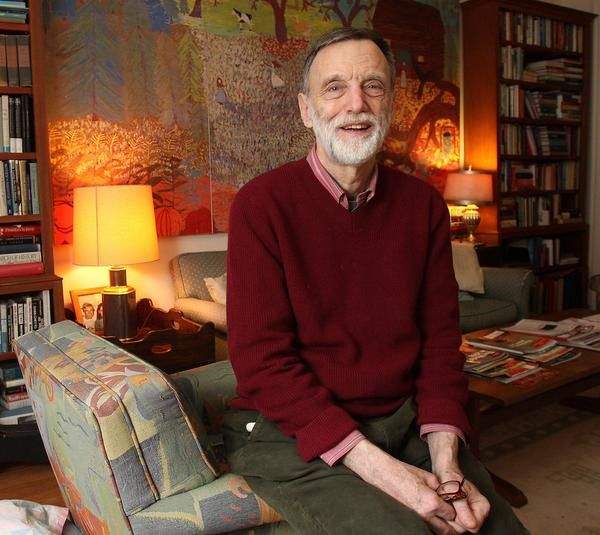
FDR's grandson has advice for Obama Jun 3, 2010 |

http://www.lohud.com/article/99999999/NEWS01/105110002/FDR-s-grandson-has-advice-Obama?
Frank Roosevelt, the grandson of President Franklin Delano Roosevelt, is an
economics professor
at Sarah Lawrence College in Yonkers. Roosevelt, who was 6 when his grandfather
died in office,
has advice for President-elect Barack Obama: "He needs to take action."
/ Tania Savayan/The Journal News
Written by Jorge Fitz-Gibbon The Journal News
NEW YORK - Frank Roosevelt thinks his famous grandfather could be an example
to Barack Obama-
starting with FDR's mistakes.
Roosevelt, an economics professor at Sarah Lawrence College in Yonkers and the
32nd president's
grandson, said Obama should throw more money at the fractured economy than FDR
ever did during
the New Deal.
He said Obama should do something his grandfather wouldn't do 76 years ago
- embrace the
deficit-spending theories of economist John Maynard Keynes.
"FDR never did get the Keynsian thing, and therefore the whole New Deal
effort was not big enough,"
said Roosevelt, 70. "I mean, it didn't get us out of the Depression, really,
until World War II came along,
and then government spending really got big enough to really employ everybody
and then some."
On the eve of his historic ascension to the presidency, Obama has increasingly
been measured by the
standard set by Franklin Delano Roosevelt - a leap not everyone is willing to
make.
Roosevelt proudly welcomes the comparisons, but did caution Obama to view FDR
as a history lesson
as much as a role model.
"He needs to take action," he said. "But I don't think he needs
to do 15 different things, because FDR
was just sort of flailing about, and they were trying this and trying that.
They were in the right direction,
but he had no theoretical knowledge that we have now."
Inspiring leaders
Roosevelt was 6 when his grandfather died in office. A Yale-educated economist,
Roosevelt has been
on the Sarah Lawrence faculty since 1977. He is an Obama supporter who contributed
to the Illinois
senator's presidential campaign and his inauguration fund.
He sees some of his grandfather in the president-elect.
"I think their personalities are both calm, steady, intelligent, and hopeful
people," Roosevelt said.
"Hopefully, Obama will inspire the nation, and I think he's going to do
something like the fireside
chats, although using the Internet now and YouTube."
And there are other similarities between the 1932 and 2008 presidential races,
said Ralph Stein,
a constitutional law professor at Pace Law School in White Plains.
"The outgoing presidents in both cases represent viewpoints that have been
largely repudiated by
the electorate," Stein said. "And in both instances, there's an economic
crisis that has galvanized
the country, and a belief that a new administration can make things a lot better."
But Stein also said the comparisons were being exaggerated.
"The first 100 days of the FDR administration were actually conservative
in this regard: The country
was sliding very rapidly towards what could have been significant disunion,"
he said. "And what
he did is he stabilized the country through his measures, that there was a future."
"And I think we don't have that kind of attitude today," Stein said.
"I think the majority of people
believe that the transition is to a more stable economic platform and that Obama
will do that."
'Shallow' comparison
Political consultant Hank Sheinkopf went so far as to call the comparisons "shallow."
He said
the America that Roosevelt inherited in 1933 was in much deeper crisis and had
yet to become
the world-leading power it is today.
"We are in a crisis, but we're not in a depression. We do not have bread
lines on the streets,"
he said. "The social scene and the economic world are entirely different
today than the world
in which Roosevelt operated."
Roosevelt agrees on the differences in the economies each man inherited. Unemployment
hit
25 percent in the 1930s, while it has not even hit double-digits today. He also
said the economy
had hit bottom by the time FDR was sworn in, while economists suggest that the
worst is yet
to come in the current recession.
He said Obama is also more of a centrist than this grandfather was. FDR inspired
significantly
more hatred from critics who saw the New Deal as a dangerous experiment in socialism.
"I've actually had experiences of very conservative Republicans being quite
nasty to me
just because they hated FDR," Roosevelt said. "People who were on
the right felt that
government, whatever it did, was evil. Government was the boogie man."
'Go for broke'
But Roosevelt's biggest gripe with his grandfather is that he didn't spend enough
to jump-start
the economy. He is among the modern-day economists who espouse Keynsian thinking.
In short, Keynes believed that public investment funded by deliberate government
deficits
was the best remedy for a faltering economy, rather than relying on private-sector
forces
that he believed were unreliable because they were motivated by self-interest.
It's a lesson Roosevelt said his grandfather never learned. FDR even sparked
a new economic
downturn in 1937 by attempting to balance the budget - a historical blip that
Roosevelt wrote
a paper on while studying at Yale.
Now, Roosevelt said, he hopes the nation's soon-to-be 44th president will heed
the lesson.
"I think Obama has to learn from that and forget about balancing the budget,"
Roosevelt said.
"Spend, spend, spend until we've done enough to stop this decline."
"So if I could talk with him, I would say, 'Go for broke,'" he said.
"Literally, go for broke."